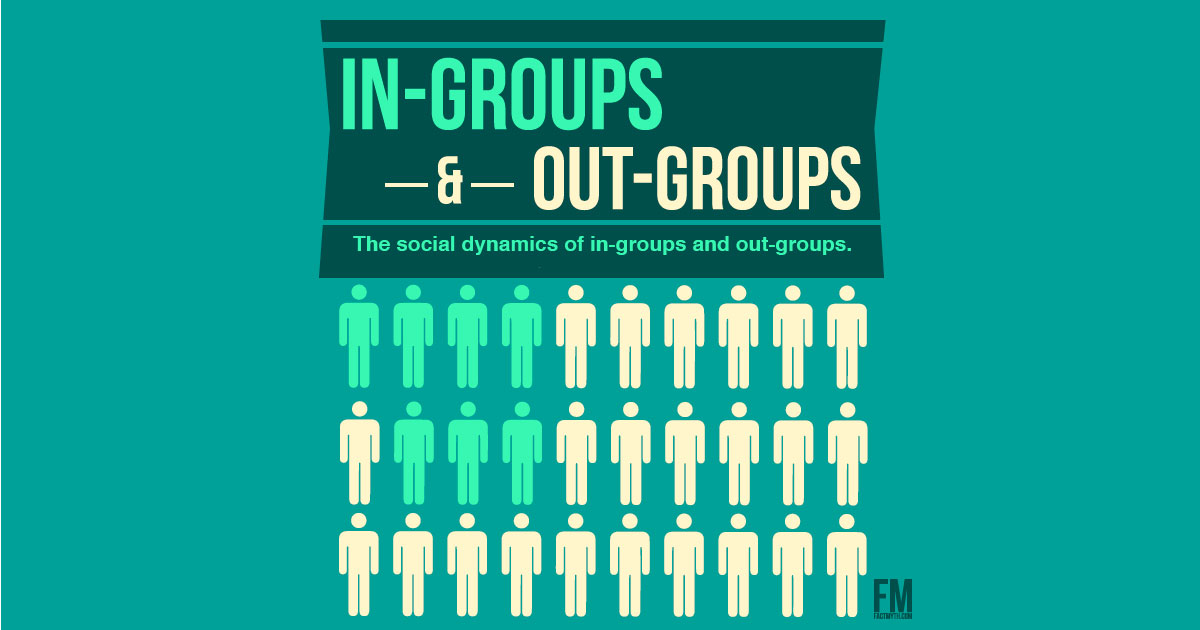In-groups and Out-groups Explained

What are In-Groups and Out-Groups?
The terms “in-group” and “out-group” are social science terms. In this context:
An “in-group” is a group you are part of (genetically, culturally, or ideologically), while an “out-group” is a group you aren’t part of.
More specifically, our in-group is a group we are a part of or identify with (genetically, culturally, or ideologically), and our out-group is the opposite, a group we don’t identify as being a part of or aren’t a part of (genetically, culturally, or ideologically). This is complicated by other people’s perception of us (where other people can place us in groups we don’t place ourselves), but generally this is the concept.
This in-group/out-group phenomena is related to other key concepts like bias and identity politics, in that both relate to how people identify with groups, and how groups identify with people.
Why Does Talking About In-Groups and Out-Groups Matter?
This matters greatly, as a lot of our hardwiring and softwiring, and consequently our bias, is rooted in how we identify, or don’t identify, with groups (or how groups do or don’t identify with us).[1][2]
This conversation includes everything from family dynamics and the relationship between children and their community, to comments on nativism and nationalism, individualism and collectivism, and identity politics.
In other words, the concepts of “in-group and out-group” speak to complex natural and learned social relations at heart psychology, politics, and the social sciences in general.
Do We Get to Choose Our In-Group?
Typically the terms “in-group and out-group” denote “a social group with which a person psychologically identifies as being a member, or not a member.”
However, although we get to choose what groups we identify with, in cases of perception and genetics, the choice is not always wholly one of the individual.
What groups one perceives themselves to be a part of, and what groups others perceive them to be a part of can differ greatly.
Consider, a French speaking white male has a long road ahead of them to become a leader of an English speaking feminist centered Black Lives Matter group in Kansas, regardless of how they identify with that groups ideologically.
Thus, as I hope the example above illustrates, there is no single controllable or uncontrollable factor related to “belonging” such as personal identity, nationality, or a genetic trait.
Instead, “in-group and out-group” are general terms that can relate to any aspect of being part of a “collective” or not.
Human Nature – Ingroup vs Outgroup. Paul Bloom discusses in-groups and out-groups, us and them, and the science of bias and prejudice.TIP: Think terms like “me versus you” and “us versus them”, we are talking about these concepts through the lens of social science and neurology.
TIP: What is correct behavior changes by what your in-group and out-group is, and what group you are communicating with (this is one thing that trips people up when trying to understand “politically correct.”) For example, in the LGBT community the acronym LGBTQ may be used, but outside of the community the acronym LGBT is acceptable. A group of black Americans may use particular colloquialisms when speaking with each other, but a radio host will lose their job over saying the same things (even in a joking manner). These are just small indications of the power of “in-group versus out-group.”

Why are In-Groups and Out-Groups Important?
In-groups and out-groups are particularly important to the social sciences as a lot of nature- and nurture-based psychology ends up being directly related to in-group and out-group affiliation.
If one considers politics, economy, and group relations in these things, one can quickly see how group dynamics are central to much of the human experience.
This is specifically important when talking about bias, because many biases are based on psychological attitudes toward groups we are or aren’t a part of.
The most famous of these biases is the set of familiar prejudice and discrimination related “social” biases (be they implicit or explicit social biases).
These social biases then compound via group dynamics, and from there we can talk about things like the natural and conventional aspects of political ideology and go off into complex conversations.
In words, the concept is simple, but the implications are vast. We often reference in-groups and out-groups on the site; now you know what we are talking about.
When ‘I’ Becomes ‘We’ | Mina Cikara | TEDxCambridge. Learn more about Mina Cikara.Learn more about Ingroups and Outgroups from Wikipedia.
Us vs. Them: Ingroup vs. Outgroup Psychology (BO1 & Ghosts Gameplay). Social Science plus Call of Duty, finally (an oddly amazing video in many respects).TIP: Children are born both naturally selfish and compassionate. This hardwired bias relates directly to the concept of in-group out-group. This is one of the countless examples of why identity and groups are important to research and understand.
Prejudice & Discrimination: Crash Course Psychology #39. Group dynamics from the lens of the psychology of prejudice and discrimination.- “Ingroups and outgroups” Wikipedia.org
- “In-groups, out-groups, and the psychology of crowds” Psychologytoday.com
